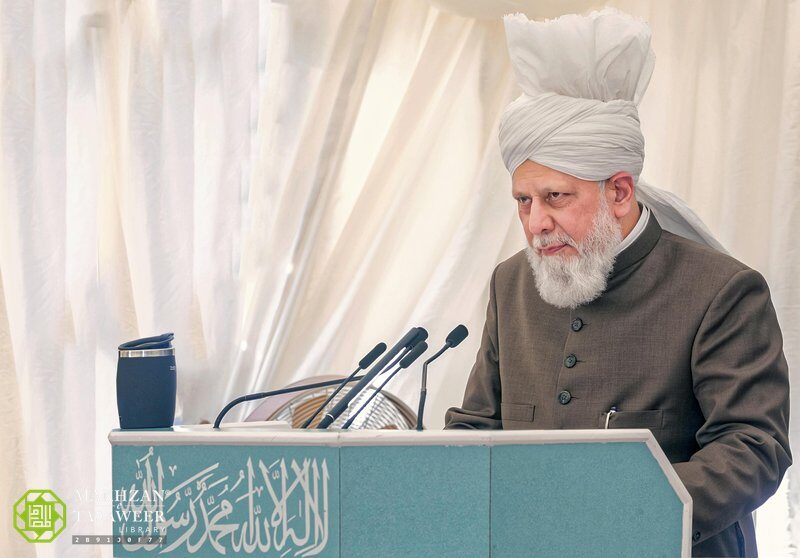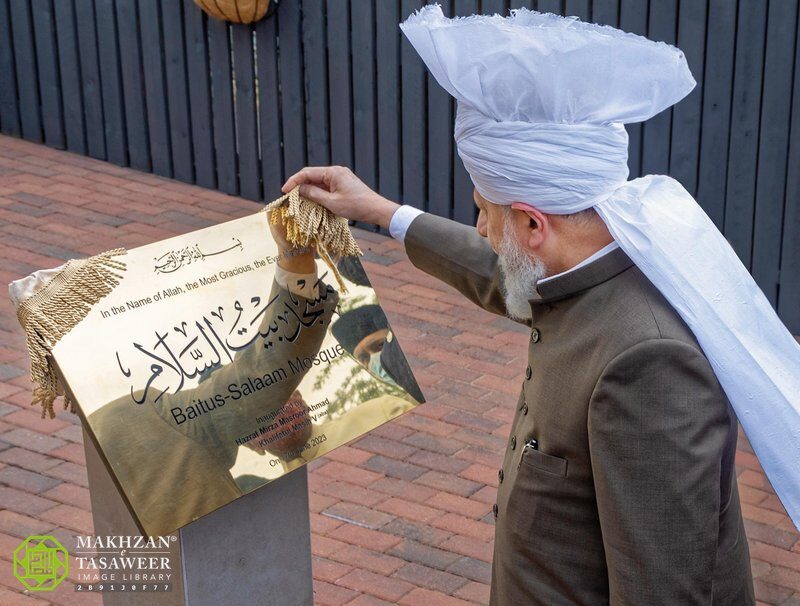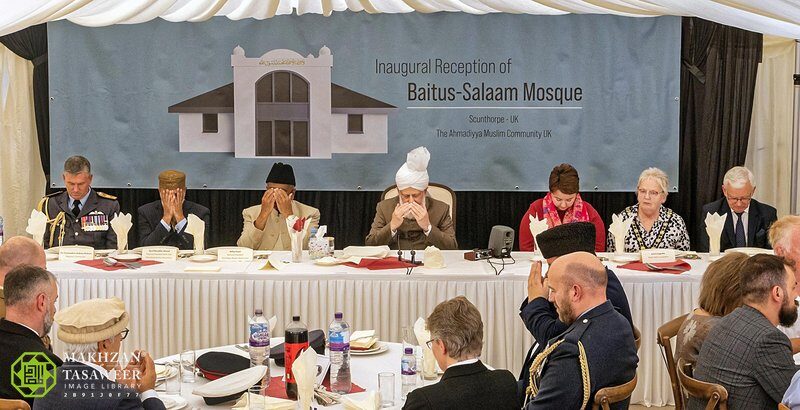
At around 16:00 BST on 17 June 2023, Hazrat Khalifatul Masih V, may Allah be his Helper, arrived at the premises for the inauguration of Baitus Salaam Mosque in Scunthorpe, UK, and unveiled the plaque of the mosque and led everyone in silent prayer. Hazrat Amirul Momineenaa inspected the building and planted an olive tree, before proceeding inside the mosque and leading everyone in Zuhr and Asr salat. There, the local members also had the opportunity to have photographs taken with beloved Huzooraa. Huzooraa also granted an audience to some of the non-Muslim dignitaries, who had come to attend the inauguration.

Huzooraa then went to the formal reception marquee and conveyed salaam to all the attendees. Dignitaries, leaders of various faiths, friends, locals and neighbours were present for the reception.
Hassan Selby Sahib, missionary at Scunthorpe, recited verses 128-130 of Surah al-Baqarah from the Holy Quran and presented their English translation.
Syed Muzaffar Ahmad, the Regional Amir of North East, welcomed Huzooraa and all the attendees. He then gave an overview of the inception of the Baitus Salaam Mosque and shed light on the opposition they had to face when the request for permission to construct this mosque was presented before the council. Syed Muzaffar Ahmad Sahib expressed that the council upheld its values of tolerance and freedom of religion and gave permission for the mosque to be constructed.
Holly Mumby-Croft, Member of Parliament for Scunthorpe, was next to speak. She welcomed Hazrat Khalifatul Masih Vaa to Scunthorpe and said that she had visited the mosque before and expressed her delight about the friendly atmosphere. She said that she was privileged to be at the reception.
Martin John Vickers, Member of Parliament for Cleethorpes, then expressed that he was delighted to be at the inauguration of the mosque and spoke about the challenges faced by the Ahmadiyya Muslim Community before the construction of the mosque.
Councillor Janet Longcake, Mayor of North Lincolnshire Council, then shed light on the importance of community and expressed that, “the Ahmadiyya Community motto ‘Love for All, Hatred for None’, conveys unity,” and added that “your faith is one that promotes peace and harmony, something the world needs right now.”
Address by Hazrat Khalifatul Masih Vaa

Then, Hazrat Amirul Momineenaa came to the podium and after reciting tashahhud and ta‘awwuz, Huzooraa said:
“Peace and blessing of Allah be upon you all. First of all, I sincerely thank all of our guests, who have joined us for the inauguration of our new mosque here in Scunthorpe.” He acknowledged the generosity of the guests as none of them was directly related to the Ahmadiyya Muslim Jamaat yet they accepted the invitation.
Huzooraa then said that certain hurdles arose before the construction of the mosque but with the grace of Allah, all issues were resolved and eventually, permission was granted. He thanked the council and the relevant authorities. He further expressed thanks and gratitude to “all members of the community who supported us in any way.” He emphasised, “Where we are most grateful to God Almighty we are also very grateful to those who helped us in the construction of the mosque.”
Stressing the importance of thankfulness in Islam, Huzooraa expressed, “Offering my appreciation to you is actually a religious duty because the Holy Founder of Islam, the Holy Prophet, Muhammad, peace and blessings of Allah be upon him, stated that a person who is not thankful to his fellow human beings cannot be grateful to God Almighty. So, from a religious perspective, I am duty-bound to offer my heartfelt appreciation to all of you.”
With regard to the funding for the mosque, Huzooraa explained that this mosque had been funded purely by the contributions of the members of the local jamaat, many of whom made huge financial sacrifices. They contributed to having a place of worship that would be a means of creating a suitable environment to uphold and practice Islam’s ideals and values.
Huzooraa then addressed the fears about Islam in the West and said, “Such fears are understandable, given the climate in which we live where there is a tendency to view Muslims with a degree of suspicion or even as extremist based on the portrayal of Islam in the media and the conduct of the few extremist individuals and groups in recent times.”
Reassuring the guests, however, Huzooraa said, “In this regard, rest assured that nothing could be further from the truth. Islam’s teaching is diametrically opposed to all forms of extremism or terrorism. Islam rejects all forms of violence and teaches peace and harmony, and desires for people of all beliefs and religions to live amicably together in a spirit of mutual tolerance and compassion. It calls for members of society to unite as human beings, irrespective of their differences, in the common cause of establishing peace and security for all mankind.”
Huzooraa said, “In terms of the objectives of mosques, on one occasion, the Founder of the Ahmadiyya Muslim Community, peace be upon him, stated that ‘if a person wishes to raise awareness of Islam in any town or place, they should build a mosque in that area.’”
Hazrat Amirul Momineenaa stated that it meant, if a mosque was built, non-Muslims would naturally come to observe Islam’s teachings and see how it promotes the spirit of love, peace and brotherhood amongst all people. They would see with their own eyes that where Muslims are duty-bound to fulfil the rights of Allah the Almighty, the teachings of Islam also require them to fulfil the rights of humanity and to seek the very best of all people, irrespective of their faith and beliefs.
Huzooraa said, “We Ahmadi Muslims advocate and subscribe to these true and peaceful teachings of Islam and reject unequivocally those who seek to malign and distort Islam’s noble teachings through their hateful rhetoric and extremist acts.”
Hazrat Amirul Momineenaa said that some people did not understand what Islam actually was and what was the purpose of mosques. “I wish to make it crystal clear that the image created of Islam by extremists is entirely at odds with its actual teachings[…] Islam’s teachings are of peace, security and love,” Huzooraa emphasised.
Hazrat Amirul Momineenaa said, “These are not just my personal views or empty words designed to please or impress you. Rather, these are the teachings of Islam’s Holy Book, which we believe to be the final law-bearing Book and the direct Word of God, received through revelation by the Holy Prophet Muhammad, peace and blessings of Allah be upon him. I am speaking, of course, about the Holy Quran, which, for all Muslims, serves as the basis of our beliefs and how we live our lives. The Holy Quran makes it categorically clear that there is no room for extremism or compulsion in religious matters and that every person is free to live their life according to their beliefs and customs.”
Huzooraa said, “Wherever Muslims build mosques, they are built to emulate and spiritually mirror the true objectives of the first house of God, the Holy Ka‘aba in Mecca, which is the most sacred and holy place in Islam.” He further said, “Indeed, it is the direction of the Holy Ka’bah that every Muslim turns towards whilst offering prayers.”
Hazrat Amirul Momineenaa then gave the example of Chapter 25, verse 24 of the Holy Quran, “The true servants of the Gracious God are those who walk on the earth humbly and when the ignorant address them, they avoid them gracefully by saying peace.”
Huzooraa explained that in this verse, Muslims were commanded to remain humble and patient when they were subjected to harassment and to avoid conflict or disputes. “Muslims are taught that no effort should be spared in upholding the peace of society, to the extent that the Quran instructs Muslims to walk away in the face of intense provocation and offer salaam, that is, greetings of peace, to ignorant and abusive people who speak harshly or seek confrontation.”
Hazrat Amirul Momineenaa said that some people might say that early Islamic history included incidents of warfare, but Huzooraa said, “In reality, these questions indicate an ignorance of early Islamic history.” Huzooraa said such views had been shaped by the opponents of Islam who presented only part of the story and did not give the whole account or context.
Huzoor said, “After Islam was founded, the Holy Prophet Muhammadsa and his followers were subjected to horrific cruelties and sustained oppression.” Many were murdered and they migrated to Medina. However, the idol worshipers of Arabia still did not permit them to live in peace. They waged war against them to eliminate Islam once and for all. Only in those extreme circumstances, Allah allowed them to fight a defensive war.
Huzooraa explained in light of the Holy Quran that Allah commanded Muslims to protect every worship place and defend every faith.
Hazrat Amirul Momineenaa mentioned that the American scholar, Craig Considine, in his book, People of the Book – Prophet Muhmmmad’s Encounters with Christians, states “‘Muhammad and the believers of Muslims ummah created a nation founded upon allyship, civility, cross-cultural interactions, freedom of conscience, freedom of religion, freedom of speech, interreligious dialogue, mutual dependency and religious pluralism.’” [p. 384]
“Accordingly, these are the immaculate standards of religious freedom according to Islam, that all people should have the right to worship according to their religious beliefs and be free to congregate in their places of worship,” Huzooraa said.
Huzooraa said, “In essence, Muslims are duty-bound to not only fulfil the rights of their Creator but also to fulfil the rights of mankind.”
As Huzooraa shifted the focus of his speech to the present times, he made observations about the state of current global conflicts and explained, “Religious wars are no longer taking place. Rather, the conflicts we observe today are geopolitical in nature. If Muslims or Muslim nations are taking any part [in them], it is to fulfil their political ambitions and vested interests, and [they are] not motivated by their religion. Thus, in today’s society, it is not a question of Muslims against non-Muslims, nor are wars being fought to eliminate religion. In addition, it is wrong to suggest that conflict is limited to Muslim countries. The non-Muslim world is also engaged in warfare, as we see most prominently in Ukraine. Hence, as I have said, the wars taking place today are for territorial or political objectives. And it would be wholly unfair to link them to any religion or religious beliefs.”
It is for this reason and in the face of such global conflicts, Huzooraa said, that alongside building mosques and seeking to convey Islamic teachings, the Ahmadiyya Muslim Community places great emphasis on serving humanity.
Giving some examples of the humanitarian efforts of the Community Huzooraa highlighted, “For example, we have built schools and hospitals in some of the most economically deprived and impoverished countries that provide education and health care to the local people. Further, our Community is providing access to clean water to destitute people living in remote and underprivileged parts of the world by installing water wells and pumps in their local communities.”
Underscoring the universal nature of these humanitarian services, Huzooraa clarified that, “All our humanitarian services are offered irrespective of religious beliefs. In fact, most people who benefit from our schools, hospitals, or other humanitarian projects do not adhere to any religion, or at least not to our religion [of Islam]. Our efforts are underpinned and inspired by the teachings of Islam and are rendered purely for the sake and betterment of humanity. We consider the burdens of the weakest members of society to be our own, and that it is our duty to provide health and comfort to all those who are in need or vulnerable.”
In his concluding remarks, Huzooraa said:
“In short, Islamic teaching obliges us to live peacefully and to coexist with other people. It requires us to serve our communities, to strive to enrich them, and to contribute to their development.”
“Now that this mosque has been opened. I am sure that local people in Scunthorpe and the surrounding areas will see for themselves these true Islamic values in practice. Consequently, I believe that if anyone still harbours any reservations or fears about this mosque, they will soon vanish. This mosque has been named ‘The Baitus Salaam Mosque,’ which literally means ‘The House of Peace’. In accordance with this name, I am confident that the local Ahmadi Muslims will be those who foster peace and love in society, observe the laws of the land, and excel in serving their Community and the wider society. God willing, they will forever reflect the true teachings of Islam.”
“In the end, I pray that this mosque proves to be a shining beacon of peace and a means of elevating and strengthening the fabric of societal cohesion. May Allah the Almighty enable the local Ahmadi Muslims to live up to their religious teachings, and may we all, for the betterment of our nation and the world at large, live together in peace and harmony.” Amin.
“With these words, I wish to reiterate my heartfelt gratitude to all of you for joining us this evening. May Allah the Almighty bless you all. Thank you very much.”
As the event drew to its end, Huzooraa led everyone present in a silent prayer, following which dinner was served.

History of Scunthorpe Jamaat
Scunthorpe is an industrial town located in North Lincolnshire, within the ceremonial county of Lincolnshire, in England. In 2021, Scunthorpe was home to approximately 80,000 residents. The town is roughly a four-hour car journey away from the Mubarak Mosque in Islamabad, UK.
The Scunthorpe Jamaat has been profoundly fortunate and blessed, for Hazrat Khalifatul Masih Vaa has graced it with his presence on seven distinct occasions over the years. His first visit took place in the year 2004.
The history of Scunthorpe Jamaat traces back to its humble beginnings in the late 90s, when it consisted of only a few families. In 2002, the Jamaat acquired 53 Cliff Closes Road, which served as a mission house for the Scunthorpe Jamaat. However, as time passed, the Jamaat rapidly outgrew this space, prompting the need for a larger mosque. Consequently, plans for a purpose-built mosque were submitted to the council for approval in 2016. On 24 March 2018, the foundation stone of the Jamaat’s new mosque was laid by Rafiq Ahmed Hayat Sahib, the Amir Jamaat-e-Ahmadiyya UK.
Even though the Community faced significant opposition at the outset, they remained unwavering in their mission. In a beautiful testament to faith, perseverance, dedication and community spirit, the vision eventually materialised in the form of the “Baitus Salaam Mosque.” The mosque now stands not just as a building but as a symbol of peace, brought to life by the grace of Allah and the prayers and guidance of Hazrat Khalifatul Masih Vaa.
The Baitus Salaam Mosque is located at 53 Cliff Closes Road. The mosque includes a multi-purpose hall and a library. It has the capacity to accommodate 250-300 individuals. Nestled among homes, this mosque emanates a warm and inviting atmosphere. By the grace of Allah, the mosque was constructed solely through the contributions of the local members of Scunthorpe Jamaat.
(Report prepared by Al Hakam)

